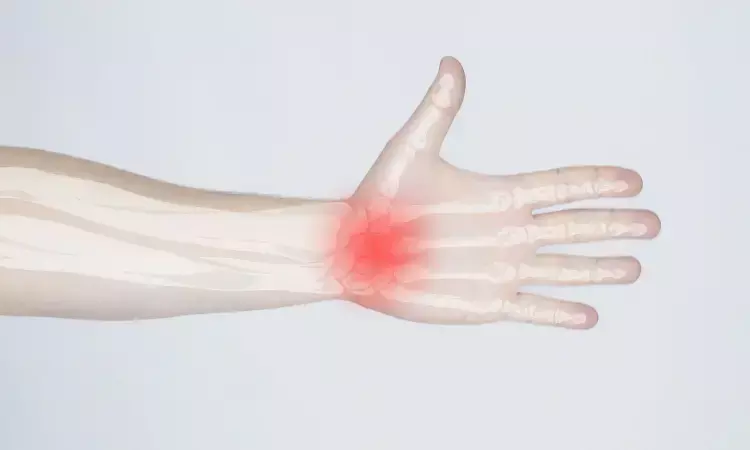- Home
- Medical news & Guidelines
- Anesthesiology
- Cardiology and CTVS
- Critical Care
- Dentistry
- Dermatology
- Diabetes and Endocrinology
- ENT
- Gastroenterology
- Medicine
- Nephrology
- Neurology
- Obstretics-Gynaecology
- Oncology
- Ophthalmology
- Orthopaedics
- Pediatrics-Neonatology
- Psychiatry
- Pulmonology
- Radiology
- Surgery
- Urology
- Laboratory Medicine
- Diet
- Nursing
- Paramedical
- Physiotherapy
- Health news
- Fact Check
- Bone Health Fact Check
- Brain Health Fact Check
- Cancer Related Fact Check
- Child Care Fact Check
- Dental and oral health fact check
- Diabetes and metabolic health fact check
- Diet and Nutrition Fact Check
- Eye and ENT Care Fact Check
- Fitness fact check
- Gut health fact check
- Heart health fact check
- Kidney health fact check
- Medical education fact check
- Men's health fact check
- Respiratory fact check
- Skin and hair care fact check
- Vaccine and Immunization fact check
- Women's health fact check
- AYUSH
- State News
- Andaman and Nicobar Islands
- Andhra Pradesh
- Arunachal Pradesh
- Assam
- Bihar
- Chandigarh
- Chattisgarh
- Dadra and Nagar Haveli
- Daman and Diu
- Delhi
- Goa
- Gujarat
- Haryana
- Himachal Pradesh
- Jammu & Kashmir
- Jharkhand
- Karnataka
- Kerala
- Ladakh
- Lakshadweep
- Madhya Pradesh
- Maharashtra
- Manipur
- Meghalaya
- Mizoram
- Nagaland
- Odisha
- Puducherry
- Punjab
- Rajasthan
- Sikkim
- Tamil Nadu
- Telangana
- Tripura
- Uttar Pradesh
- Uttrakhand
- West Bengal
- Medical Education
- Industry
Simple and comprehensive score may identify individuals at low and high risk of inflammatory arthritis.

A recent original investigation published in Annals of Internal Medicine entitled "Predicting Inflammatory Arthritis in At-Risk Persons: Development of Scores for Risk Stratification" by Laurence Duquenne, MD et al. and colleagues have concluded that simple score identified people at low inflammatory arthritis risk; these are less likely to require further medical attention. In contrast, a comprehensive score identifies individuals at a higher risk of IA. The study highlighted the importance of both these scores in patient care and research.
The study background is based on the fact that Inflammatory arthritis (IA) is an immune-related condition. This is defined by clinical synovitis, and one of the most common forms of inflammatory arthritis is rheumatoid arthritis.
In this study, the researchers' main objective was to develop scores for predicting IA in at-risk persons using multidimensional biomarkers in a Prospective observational cohort study at Single-center, Leeds, United Kingdom.
The study participants had new musculoskeletal symptoms, a positive test result for anticitrullinated protein antibodies, and no clinical synovitis.
The participants were followed for 48 weeks or more or until the occurrence of Inflammatory arthritis.
The results of the study are:
- There were 455 participants.
- Inflammatory arthritis developed in 32.5% of the participants.
- Nearly 70 participants constituting 15.4%, developed IA within one year.
- The simple score identified 249 low-risk participants with a false negative rate of 5%.
- There were 206 high-risk participants with a false-positive rate of 72%.
- One hundred nineteen high-risk participants were identified with a comprehensive score with a false-positive rate of 29%. There were 336 low-risk participants with a false-negative rate of 19%.
- 40% of high-risk participants developed IA within one year, and 71% developed IA within five years.
The study's limitations were a requirement of External validation, geographic variation in laboratory testing and recruitment availability.
They concluded that the simple score identified individuals at low risk of IA and were less likely to need secondary care.
High-risk persons were identified by the comprehensive score who could benefit from risk stratification and preventive measures.
They noted the benefits of both these scores in clinical care and clinical trials.
As acknowledged, National Institute for Health and Care Research Leeds Biomedical Research Centre funded the study.
Further reading:
BDS, MDS in Periodontics and Implantology
Dr. Aditi Yadav is a BDS, MDS in Periodontics and Implantology. She has a clinical experience of 5 years as a laser dental surgeon. She also has a Diploma in clinical research and pharmacovigilance and is a Certified data scientist. She is currently working as a content developer in e-health services. Dr. Yadav has a keen interest in Medical Journalism and is actively involved in Medical Research writing.
Dr Kamal Kant Kohli-MBBS, DTCD- a chest specialist with more than 30 years of practice and a flair for writing clinical articles, Dr Kamal Kant Kohli joined Medical Dialogues as a Chief Editor of Medical News. Besides writing articles, as an editor, he proofreads and verifies all the medical content published on Medical Dialogues including those coming from journals, studies,medical conferences,guidelines etc. Email: drkohli@medicaldialogues.in. Contact no. 011-43720751


